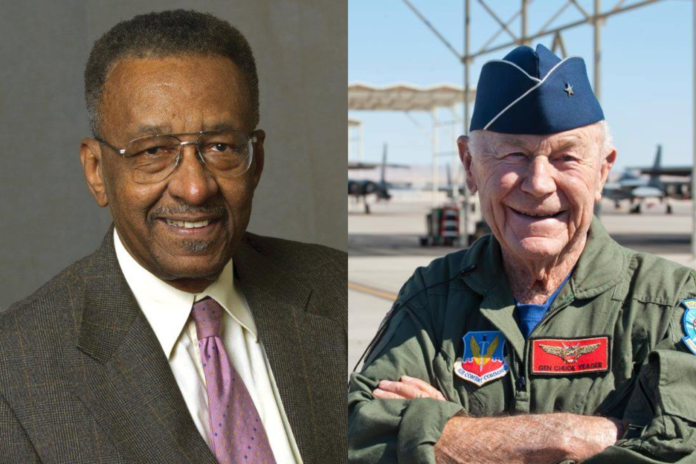Chuck Yeager was raised in an unincorporated Appalachian community in southern West Virginia. A standout high school athlete, he enlisted in the U.S. Army Air Forces in September 1941, and became an aircraft mechanic. From those humble beginnings came a 34-year military career that saw the death-defying aviator rise to brigadier general, serving in three wars.
Yeager entered combat in 1944 and, while on his eighth combat mission, shot down a German aircraft before being shot down himself. He evaded capture by enemy soldiers and rejoined his unit in England. Instead of being shipped home, he persuaded the authorities to let him fly again.
Blessed with stellar vision — a “better than perfect” 20/10, reportedly enabling him to see enemy fighters 50 miles away — Yeager totaled a dozen aerial victories on 64 missions during World War II. Most notably, he was the first human to fly faster than the speed of sound at nearly 700 mph. He did so above the Mojave Desert in 1947, piloting a rocket-propelled orange experimental airplane he nicknamed “Glamorous Glennis.” But without news broadcasts, this aviation feat was kept secret for months.
After the war, Yeager became a test pilot at Wright-Patterson Air Force Base in Ohio, flying more than 150 military aircraft.
Yeager flew for more than 60 years, including piloting an X-15 to nearly 1,000 mph at age 79. His exploits were told in Tom Wolfe’s 1979 book “The Right Stuff,” which also inspired the 1983 film.
About a decade ago, Yeager explained why he didn’t seek publicity.
“You don’t do it to get your damn picture on the front page of the newspaper,” he said. “You do it because it’s duty. It’s your job.”
Charles Elwood Yeager died on Pearl Harbor Day. The American icon was 97.
A dozen years younger than Yeager, Walter Williams came from humble origins, raised without his father. He shoveled snow, washed dishes and shined shoes during his childhood in Philadelphia to earn money.
After attending one community college semester, he worked as a taxi driver before being drafted into the U.S. Army in 1959, where he experienced racial injustice.
Williams resumed his education upon return from serving in Korea, earning a bachelor’s degree at California State University, Los Angeles, and both his master’s degree and PhD in economics from UCLA. He traced his political evolution to graduate school, when he turned toward Milton Friedman’s Chicago school of economics and libertarian leanings.
Many believe Williams never got the praise he deserved because, as an academic, he vociferously defended free-market capitalism and opposed affirmative action programs, reparations, and what he deemed the minimum wage “folly.”
Along with Thomas Sowell, his 90-year-old friend and peer, Williams was among the economic geniuses of his generation.
In a recent tribute, Sowell noted:
“Walter once said he hoped that, on the day he died, he would have taught a class that day. And that is just the way it was. He was my best friend for half a century. There was no one I trusted more or whose integrity I respected more.”
As chairman of the economics department at George Mason University, and through his weekly columns — the final one ran last week — 10 books, and myriad speeches, he argued racism alone cannot be blamed for poverty, crime, and under-performing schools. Everything Williams wrote is worth reading, but especially this 2013 column.
Walter Edward Williams died Dec. 1 at age 84. A daughter and grandson survive him.
A.J. Kaufman
A.J. Kaufman is an Alpha News columnist. His work has appeared in the Baltimore Sun, Florida Sun-Sentinel, Indianapolis Star, Israel National News, Orange County Register, St. Cloud Times, Star-Tribune, and across AIM Media Midwest and the Internet. Kaufman previously worked as a school teacher and military historian.











